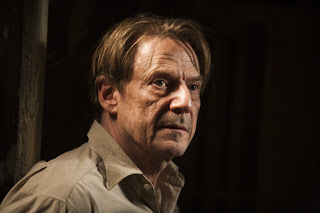The Best Exotic Marigold Hotel is a surprising pleasure. The main draw, of course, is its exemplary
cast, who are introduced in their British habitats precisely in time to leave them.
 |
| Maggie Smith, Ronald Pickup, Bill Nighy, Penelope Wilton, Celia Imrie, and Judi Dench. (c) 2011 Fox Searchlight. |
-
Evelyn Greenslade — the delightfully subdued and
spectacular Judi Dench — is recently
widowed, having some issues with income and outsourced call centers as we all
have. While the remaining men in her
life try to solve her problems as they see fit, she decides to give a whole new
life a try.
-
Douglas and Jean Ainslie — Bill Nighy and Penelope
Wilton — are retiring. Well, he
is. She is a housewife with dreams of
glory. They’ve entrusted their
retirement funds to their daughter, so presently cannot afford to live as Mrs.
Ainslie would like to become accustomed.
Listen for her “turning left” dream.
They’re a mismatched pair, him self-effacing, self-sacrificing and kind;
her, not so much. Even when she’s not
whining, we brace for a sour note.
-
Graham Dashwood, a dashing judge — the always
welcome Tom Wilkinson — is suddenly
of a mind to retire. Get away from it
all, and back to the land of his youth.
And possibly more than just the land and its light and color.
-
Mrs. Muriel Donnelly is retired, alone, and
trapped in a wheelchair. She is
humorless, bigoted, and terrified, and as played by the irresistible Maggie Smith, still likeable. She cannot get about without a new hip, the
waiting list for which is too long in England. She can get it more quickly and cheaply
elsewhere….
-
Madge Hardcastle — the wittily impish Celia Imrie — is tired of being a
live-in babysitter for her married daughter.
She wants life, and sex, and a new husband. Her adolescent grandchildren understand her better
than her own daughter, and off she goes.
-
Norman Cousins has still got it, he’s certain,
he just needs to find someone who wants it.
Ronald Pickup makes this
character a 20-something stuck in a 60-something’s body, but his forays into London nightlife are
disheartening. Norman needs a new audience for his old
pick-up lines, so he joins these strangers awaiting a flight to a new home for “the
elderly and beautiful,” the Best Exotic Marigold Hotel.
The journey is hard, the arrival disappointing, despite the optimism
and warmth of their host, the proprietor of the hotel, Sonny Kapoor. The sweet-faced and sincere Dev Patel plays Sonny with just a tad
too much enthusiasm. Sonny is in love
with (but can’t say it) the lovely Sunaina (a delicately feisty young woman
played by Tena Desae), who works for
her brother Jay’s (Sid Makkar) call
center.
 |
| Evelyn (Judi Dench) and Madge (Celia Imrie) arrive at their new home. (c) 2011 Fox Searchlight |
Sonny Kapoor has a dream:
to resurrect his father’s dream of this ancient hotel in this rundown
part of Jaipur, India. His ruling mantra is “It’ll all work out in
the end. If it hasn’t, it is not yet the
end.” The Best Exotic Marigold Hotel is
a disappointment to say the least. The
phones don’t work (although the computer connected to the internet does), and
Madge’s room doesn’t even have a door — until she takes over Sonny’s room, so
now he’s in a room without a door.
That’s Madge for you. Madge and
Norman look for love separately and keep bumping into each other. Graham was brought up in India, so he’s looking for his
rose-colored memories, perhaps, or perhaps something more. Evelyn reinvents herself in this new land by
getting her very first job — in Sunaina’s brother Jay’s call center of all
places. Douglas Ainslie is enthralled by
his surroundings, the smiling faces, the food, the land, the buildings, the
history. Jean Ainslie won’t leave the
hotel she hates. Mrs. Donnelly gets her
surgery despite her fears, and settles in, talking to the silent food
server. Real life interferes on occasion
in the person of Sonny’s mother (Lillete
Dubey), but not too much. Even the
traffic jams are entertaining.
 |
| Judi Dench, Tom Wilkinson, Bill Nighy. (c) 2011 Fox Searchlight. |
Does all this sound too good to be true? Sure, but during the film no one cares.
The actors are all very fine. They take a lightweight script by Ol Parker (based on a novel by Deborah Moggach) and make it work. John Madden’s direction is swift
without rushing. The film pronounces its
themes clearly: Love is possible at any
age, and retirement — not to mention life — will be what you make of it, money
or no money. And, of course, Sonny’s
mantra.
Every character (almost) has his or her arc of learning,
growing, taking that first terrifying step into another life. I won’t get specific here and produce
spoilers. Structurally I pronounce The
Best Exotic Marigold Hotel sound — that is, the film, not the
building! If something’s amiss, it’s
that the film is largely predictable, as is any story that strives for a happy
ending. This is a bit of summery
fluff. If you want no more than a sweet
summer fling, sit back, relax, and enjoy the ride.
 |
| Evelyn reinvented. (c) 2011 Fox Searchlight. |
~ Molly Matera, signing
off to look for a verandah and an exotic cocktail….








